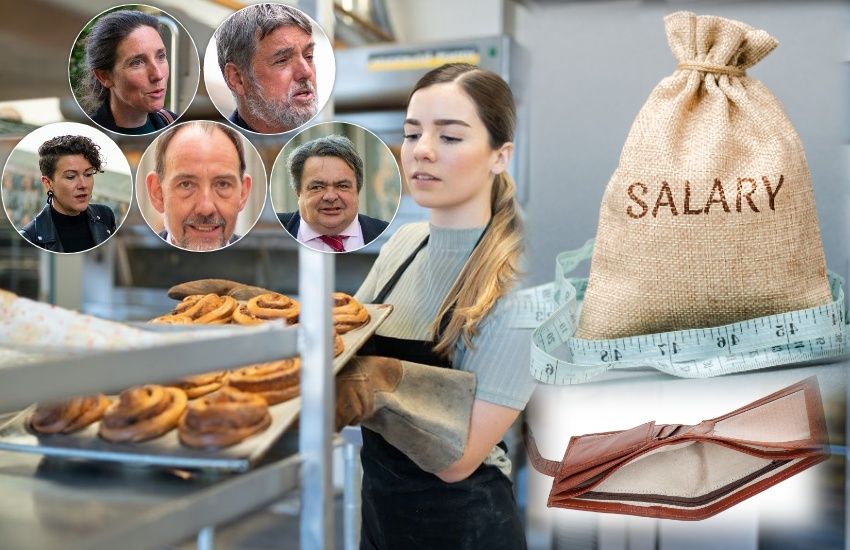


The adult minimum wage is set to rise by 5.5% in October - six months after the annual rate of inflation hit nearly 6% with the States forecasting that it will climb higher later in the year.
And young workers on low wages face a smaller rise with proposals to abandon a long-standing policy of equalising youth and adult minimum wage rates.
If this proposal is approved, the minimum salary for a 16 or 17 year old in full-time employment will be around £600 less than if the current equalising policy is maintained.

Pictured: The Committee wants to increase the legal minimum wage for young people - but by 30p per hour less than required by the current minimum wage policy which it wants to change.
Minimum wage rates are usually adjusted annually. They are currently £9.05 per hour for adults and £8.60 for 16 and 17 year olds.
Under the proposals from the Committee for Employment & Social Security, from 1 October this year the legal minimum wage for adults would be £9.55 per hour. For workers aged 16 or 17, it would be £8.95 per hour - or £9.25 per hour if the States reject the Committee's plan to end the equalising policy.
The Committee's policy letter containing the proposals will be debated by the States' Assembly in July or September.

Pictured: Prices in Guernsey are rising faster than at any time since 2008 and inflation is expected to increase further for the remainder of this year at least.
In its policy letter, the Committee acknowledges current inflationary pressures.
"At the end of March 2022, Guernsey’s annual inflation...was 5.9%. Given current issues with the global supply chain, it is anticipated that inflation will be pushed further upwards through the second half of 2022. This will have a disproportionate impact on those with low incomes," said the Committee.
However, the Committee denied that its proposed change of 5.5% to the adult minimum wage rate would leave the minimum wage trailing behind inflation.
"Although it may appear that a below [inflation] increase in the rate of the adult minimum wage is being proposed, this is not actually the case," said the Committee.
"If the Committee’s proposal is approved, the minimum wage rates will increase nine months after they were last increased. As at the end of March 2022, annual inflation over the preceding nine months...was 4.2%.
"Therefore, the proposal to increase the adult minimum wage rate by 5.5% is above inflation for this nine-month period and in line with the policy objective to equalise the rate with 60% of median earnings."
Pictured: The States' most recent forecast for the possible range of inflation rates into next year, excluding mortgage costs.
Pictured: The States' most recent forecast for the possible range of inflation rates into next year, including mortgage costs.
In November 2018, the Committee's predecessor announced it would increase adult and youth minimum wages gradually in real terms until they reached 60% of the median earnings of all workers in the island by 1 January 2023.
The incremental steps necessary to achieve this commitment were taken in 2019 and 2020 but have since been paused by the current Committee "as a result of the impact of the covid-19 pandemic on the local economy".
The Committee now intends to resume the plan - but only for the adult minimum wage rate - and to get the rate to 60% of median earnings within two years of the original target date.
"The Committee is proposing to resume the medium-term plan and bring forward the implementation date for the next step increase in minimum wage rates from 1 January 2023 to 1 October 2022," said the Committee.
"It is envisaged that the target for aligning the adult minimum wage rate with 60% of median earnings will be reached in October 2024."

Pictured: The Committee for Economic Development asked the Committee for Employment & Social Security to scrap the policy of gradually equalising minimum wage rates for adults and 16 and 17 year olds.
The Committee's propositions provide States' members with a choice of two options on the young person's minimum wage. The Committee is asking the States to scrap the policy of equalising the youth rate with the adult rate and to replace it with a policy of setting the youth rate at 90% of the adult rate by 2024. If the Committee's recommendation is defeated, States' members will vote on whether to maintain the existing equalising policy, which has been in place since 2010.
During consultation on the proposals, the Committee for Economic Development said that a majority of its members opposed equalising the youth and adult rates and wanted to see the youth rate set at £8.95 per hour rather than £9.25 per hour from 1 October this year.
A majority of the members of the Committee for Employment & Social Security agreed. The Committee's policy letter does not disclose which members dissented.
"Having considered the arguments for and against this policy objective, a majority of the Committee is of the view that a modest differential in pay on the basis of age can be justified and is appropriate given that additional training and supervision is generally required by younger workers," said Deputy Roffey's Committee.
"In coming to this view, the Committee noted that employers are at liberty to pay 16 and 17 year olds more if merited or necessary to attract staff."

Pictured: Some employees on minimum wage rates also have accommodation and food costs deducted from their wages.
Based on a 40-hour working week, the Committee's proposals would guarantee minimum annual salaries of £19,864 for adults and £18,616 for 16 and 17 year olds.
However, it would be legal for an employer who provides an employee with accommodation and food to deduct up to £129 from his or her salary.
The Committee is proposing an increase of 5.5% in these accommodation and food offsets to take effect from 1 October.
Pictured top: The members of the Committee for Employment & Social Security (clockwise from top right): Deputies Peter Roffey, President; John Gollop; Steve Falla; Tina Bury; and Lindsay de Sausmarez, Vice President.
Comments
Comments on this story express the views of the commentator only, not Bailiwick Publishing. We are unable to guarantee the accuracy of any of those comments.